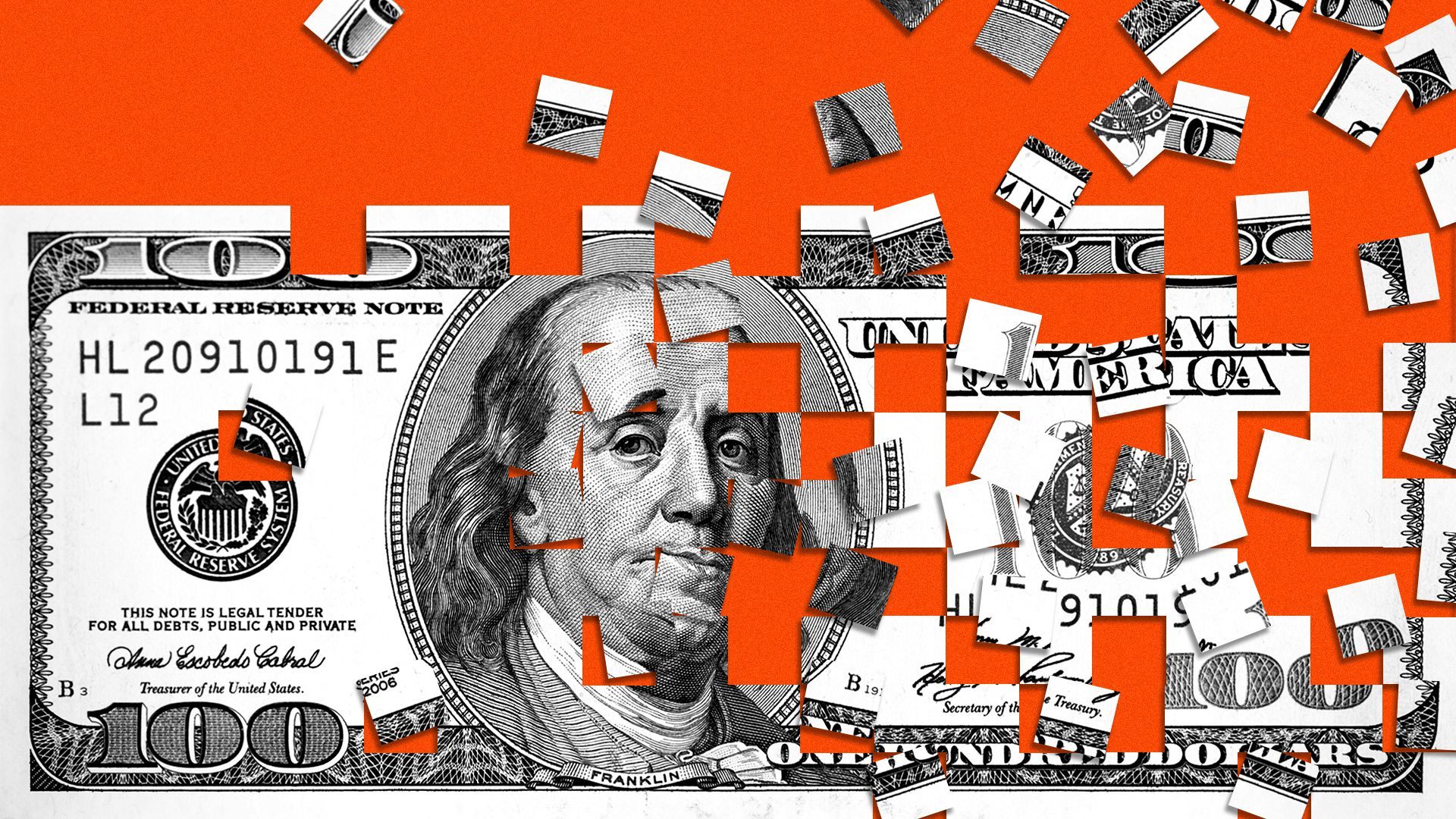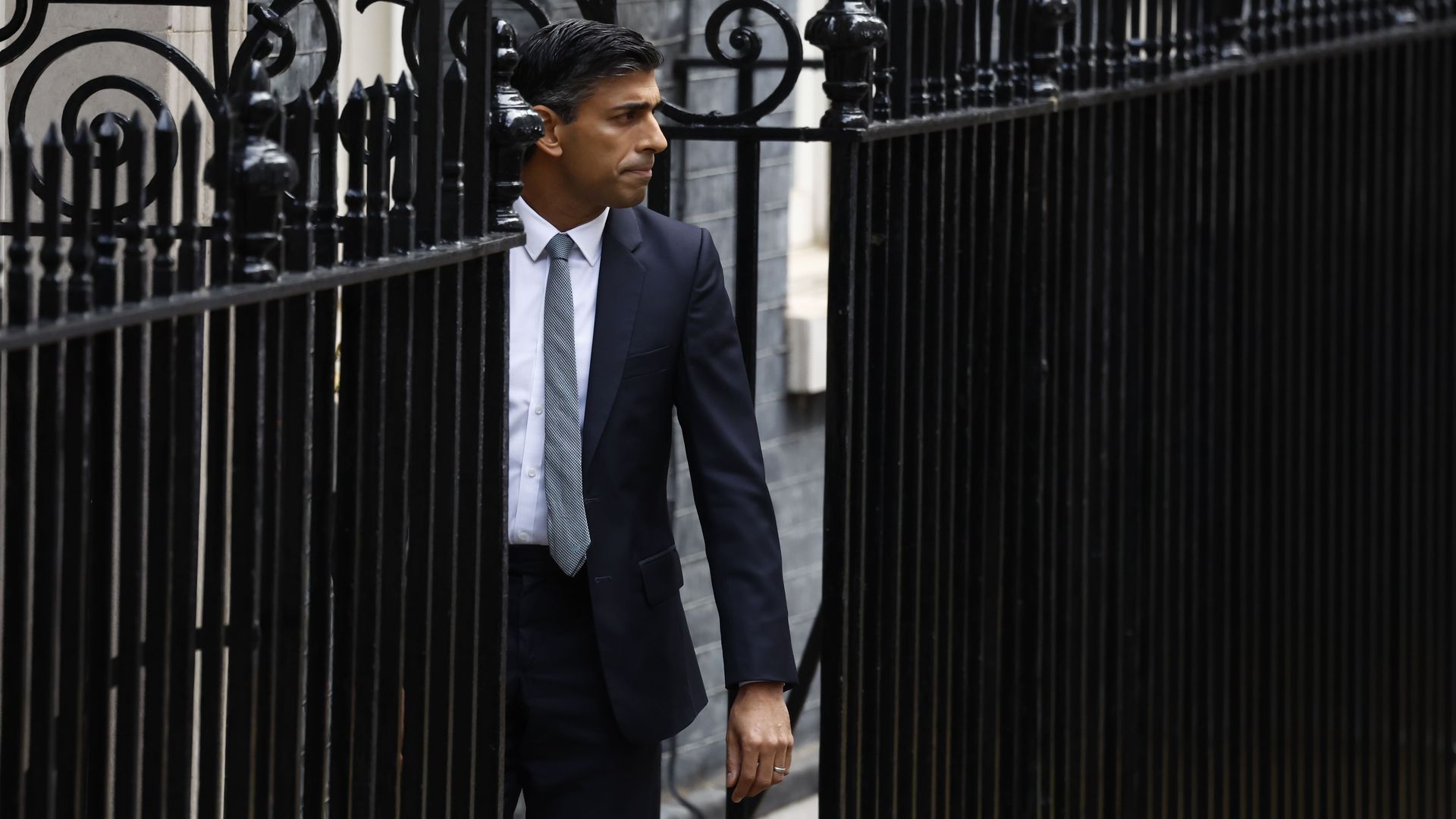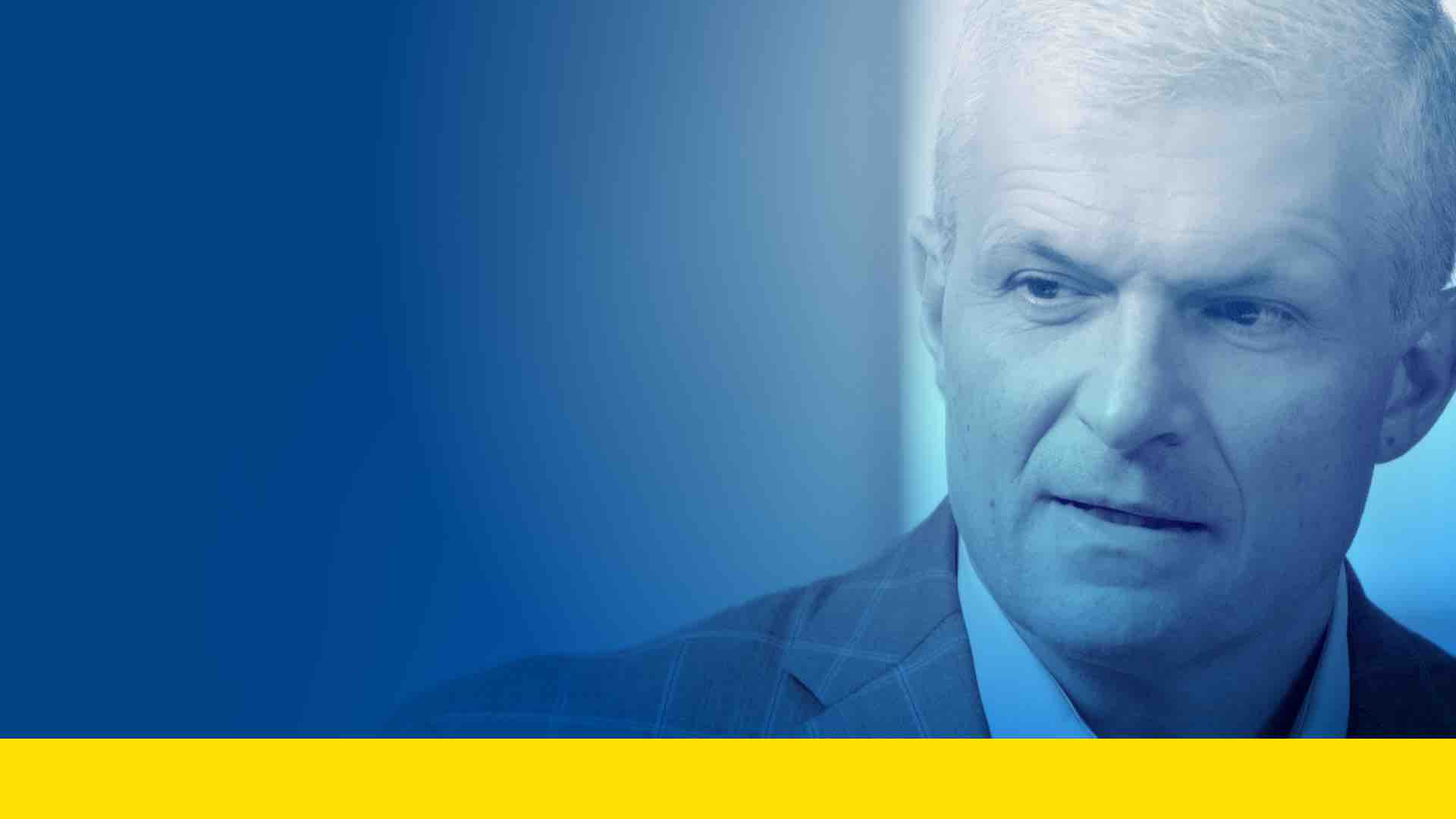| | | | | | | Presented By RBC Capital Markets | | | | Axios Markets | | By Felix Salmon · Oct 29, 2022 | | This week, a place where I have lived a substantial proportion of my life was taken over by a libertarian Gen X gazillionaire. Then it happened again. - In this week's newsletter, I'll take a look at both events — Rishi Sunak rising to become prime minister of the UK, and Elon Musk buying Twitter. It's 1,303 words, a 5-minute read.
| | | | | | 1 big thing: The cost of power |  | | | Illustration: Sarah Grillo/Axios | | | | Elon Musk and Mark Zuckerberg have both vaporized tens of billions of dollars in personal wealth in their idiosyncratic attempts to control the systems underpinning the quotidian lives led by the rest of us. Why it matters: These actions — Zuckerberg pivoting to the metaverse, Musk buying Twitter — are unprecedented in their expense. They reveal a world run not by faceless corporations, but by unpredictable and capricious individuals with almost no real financial constraints. Driving the news: Yesterday, Elon Musk bought Twitter for $44 billion, or $54.20 per share. - It's impossible to say exactly how much he's overpaying by, but my favorite rule of thumb is that the nominal Twitter share price, absent the takeover bid, would be very close to the nominal Snap share price, which is now less than $10. (The two stocks moved in lockstep before Musk revealed his interest in Twitter.)
- By that math, Musk and his silent-partner co-investors are paying a premium of about $35 billion so that the memelord can own his preferred social network.
Between the lines: Musk has said, as recently as Thursday, that he didn't buy Twitter to make more money. - There are many theories for what plans Musk may have for Twitter; the only thing that's sure is that he is bound by no fiduciary constraints.
Reality check: Facebook shareholders could be forgiven for thinking the same thing about Mark Zuckerberg, who — thanks to his company's dual-class voting structure — retains outright control despite owning only a minority stake. - Flashback: In October 2021, Zuckerberg announced a rebrand to Meta, and a profound shift "from being Facebook first as a company to being metaverse first."
- In the year since then, quarterly revenues have fallen by 4%, but thanks to increased spending on the metaverse, net income is down 52%. The company's shares have fallen by 70%.
By the numbers: The cost to Zuckerberg personally has come to some $104 billion. - The other half of the ad-sales duopoly, Alphabet, is down only about half as much as Facebook over the same period.
The bottom line: Twitter and Meta control four of the most powerful and important public utilities in the world. Musk has complete control over Twitter; Zuckerberg has similar control over Facebook, Instagram, and WhatsApp. - Both have proved themselves willing to sacrifice almost unimaginable sums of money in the pursuit of even greater influence over how we all live our day-to-day lives.
💭 My thought bubble: I often say that it's easier to turn power into money than it is to turn money into power. Musk and Zuckerberg have demonstrated just how expensive power can be — and how much certain men are willing to pay for it, all the same. |     | | | | | | 2. Rishi Sunak, technocratic austerian |  | | | Rishi Sunak outside 10 Downing Street. Photo: Jeff J Mitchell/Getty Images | | | | Rishi Sunak, the youngest UK prime minister in more than 200 years, is very comfortable taking extreme positions. The markets, however, are satisfied that, contra his two predecessors, he's neither fiscally nor morally incontinent. That makes him pretty much the best that they can hope for right now. Why it matters: Sunak enthusiastically supported Brexit, the root cause of all of Britain's current mess, going against then-leader David Cameron. But he's also pragmatic enough to deal with that mess by using an orthodox austerity playbook that will at least keep the bond vigilantes at bay. - Between the lines: The people who voted Conservative in 2019 don't like austerity, but Sunak has other ways of trying to keep them onside, including promising to do "whatever it takes" to take refugees seeking asylum in the UK and ship them to Rwanda. He has also threatened to withdraw from the European Convention on Human Rights.
The big picture: Inflation in the UK, now at 10.1%, is rapidly eroding real household income. Since 2018, the country's households have had less spending power than those of France, Ireland, or Germany, per a recent report from the Resolution Foundation. That's a big change from 2007, when the UK scored higher than all of those countries. The intrigue: Sunak worked at Goldman Sachs and a high-profile hedge fund before entering politics, but the reason he's worth somewhere north of $800 million is just that he married a gazillionaire. - In the U.S., John Kerry and John McCain got rich (if not quite as rich) the same way. Both ran for president on a platform of fiscal conservatism.
Between the lines: People who made their own billions, like Musk and Zuckerberg, generally feel free to spend that money however they like. - People who come into enormous wealth by inheritance or marriage, on the other hand, tend to be significantly more cautious when it comes to spending the kind of money that could result in a meaningful reduction in wealth.
How it works: After the UK enacted emergency fiscal spending during the global financial crisis of 2008, the Conservative Party implemented an austerity regime. The implicit idea was that after spending too much, the country needed some years of spending too little. - The current finance minister, Jeremy Hunt, is following a very similar playbook, saying he'll be making "decisions of eye-watering difficulty" when it comes to public spending.
- Sunak's predecessor Liz Truss made it clear that she disagrees with that approach, but Sunak is much more naturally aligned. He spent a lot of money as finance minister at the height of the pandemic, and is OK with swinging in the opposite direction now.
The bottom line: Sunak will be an orthodox technocrat for as long as the current economic emergency remains in place. |     | | | | | | 3. The end of the line for Credit Suisse |  Data: FactSet; Chart: Axios Visuals Up until this week, Credit Suisse could credibly lay claim to being a bulge-bracket bank, alongside maybe eight others in the world. It might have been a troubled bank, but it was huge, and tried to offer a full menu of financial services to its customers. Why it matters: Now, the bulge bracket has shrunk by one bank. Credit Suisse has announced that it's breaking itself up into four parts, in an echo of how the story of GE is ending with a whimper. Between the lines: Credit Suisse was forced into this drastic action by its woefully low share price. The market value of the company is less than a quarter of its book value, or its assets minus its liabilities. That's a clear sign that the market sees no meaningful profits in the foreseeable future. How it works: The bank is being split into four unequal parts. - The Securitized Products Group, which turns corporate cash flows into securities, is being sold to Apollo and Pimco.
- A "bad bank," or "non-core unit," is being created to hold things like the emerging-markets investment banking business until they can either be sold or wound down to nothing.
- A new boutique investment bank, CS First Boston, is being created to compete with the likes of Jefferies, Lazard, or Evercore. The hope is to spin CSFB off for billions of dollars to outside investors.
- The remaining Credit Suisse will include the global wealth management business, the Swiss retail bank, and the existing trading operation.
By the numbers: If the break-up causes the bank to trade at even half its book value, that would still mean the share price more than doubles. - The real hope is that both CS First Boston and Credit Suisse will be worth more than Credit Suisse is worth today. It's a classic sum-of-the-parts move, one that generally only makes sense when a company's share price is extremely depressed.
Of note: The architect of the plan is Michael Klein, who as part of his remit needed to find a CEO to run CS First Boston. In an echo of Dick Cheney, he chose... himself. |     | | | | | | A message from RBC Capital Markets | | Regulation and activism are on the rise | | |  | | | | How will the rise of activist investors and universal proxies affect M&A deal flow? Learn how corporate boards are responding with insights from RBC's expert bankers on "M&A Inflection Points," a limited series podcast. Start listening. | | | | | | 4. Building of the week: Hong Kong Palace Museum | | Photo: Li Zhihua/China News Service via Getty Images The Hong Kong Palace Museum, designed by local architect Rocco Yim, opened in July. - Its 85,000 sq ft of gallery space features ancient treasures from the namesake museum in the Forbidden City of Beijing.
|     | | | | | | A message from RBC Capital Markets | | Regulation and activism are on the rise | | |  | | | | How will the rise of activist investors and universal proxies affect M&A deal flow? Learn how corporate boards are responding with insights from RBC's expert bankers on "M&A Inflection Points," a limited series podcast. Start listening. | | | | Footnote: CS First Boston will resuscitate a name with a history going back to 1932. The investment bank ceased to be independent in 1990, when it was bought in a fire sale by Credit Suisse. The cause of the fire sale was the collapse of the junk-bond market broadly, and more specifically the fact that First Boston had underwritten the leveraged buyout of Ohio Mattress Company, the maker of Sealy mattresses. That meant it found itself with a huge pile of underwater bonds it couldn't sell. Just like the banks owning Twitter debt today. Thanks to Kate Marino for editing and Elizabeth Black for copy-editing today's newsletter. |  | | Why stop here? Let's go Pro. | | | | | | Axios thanks our partners for supporting our newsletters. If you're interested in advertising, learn more here.
Sponsorship has no influence on editorial content. Axios, 3100 Clarendon Blvd, Arlington VA 22201 | | | You received this email because you signed up for newsletters from Axios.
Change your preferences or unsubscribe here. | | | Was this email forwarded to you?
Sign up now to get Axios in your inbox. | | | | Follow Axios on social media:    | | | | | |
Post a Comment
0Comments